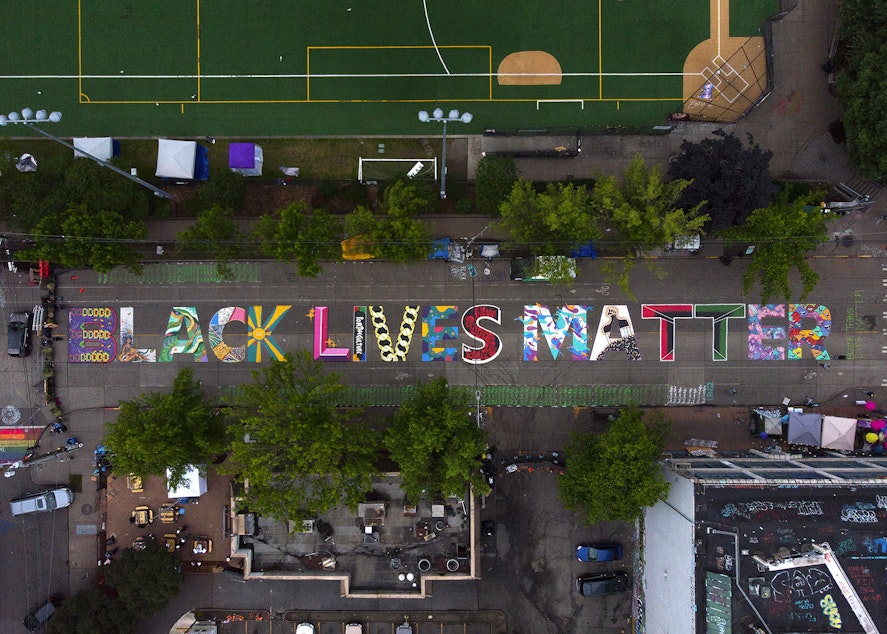3 activists on the future of the Black Lives Matter movement in Seattle

It’s been six weeks since protests started in Seattle, after the police killing of George Floyd. Now leaders of the local movement for racial justice are calling for changes to combat police brutality and systemic racism. Here's what they see next.
Among the many thousands in the streets and online who are pushing for change, three people heralding the movement in the Northwest: Ibijoke Idowu-Holiday, Dr. Estell Williams, Kamau Chege.
One is an organizer, another is a doctor, and the third is a coalition director.
Ibijoke Idowu-Holiday
You may know Ibijoke Idowu-Holiday as the brain behind protests popping up in Renton and West Seattle.
While the protests are important, she’s also focusing on mental health in the Black community. She’s planning a day for yoga in the park later this month, to relieve stress and build community. At another event, she even plans to have counselors available.
Sponsored
She’s also focusing on the money.
Last time she led a march through downtown Renton, megaphone in hand, she was sure to call out each business that did and did not stand up for Black Lives Matter.
“We are boycotting those businesses as well, hitting them in their pockets. People will shape up when their money is affected,” she says.
Idowu-Holiday says focusing attention on South Seattle was important on a personal level.
“I worked as a personal banker in downtown Renton. They made me feel very self conscious about coming to work with my natural hair or braids.”
Sponsored
She recalls a manager questioning whether her hair was "unprofessional" and describes her experiences at the bank as "almost traumatizing."
Washington state recently passed legislation that amends discrimination on the basis of hair texture and protected hairstyles. Still, there’s work to be done on many fronts and Idowu-Holiday is ready for it.
“Honestly, I see it lasting off and on throughout this whole year.”
Dr. Estell Williams
Likewise, Dr. Estell Williams also sees this movement rippling onward. She’s a mom and surgeon at the University of Washington Medical Center.
Sponsored
Williams was behind the healthcare workers march last month.
She also delivered a letter to King County council members identifying white supremacy as a public health issue. That letter has 4,000 signatures from health care workers. And Williams says that while she’s advocating for Seattle Police to lose 50% of its funding, that’s just the start.
“Just to be clear about my politics and my household, we are abolitionists. So there is no reform. There is no continuing to fund any aspect of policing as it exists.”
Williams also points to needing allies at all levels to do the work for racial justice.
“You need individuals who are addressing it, not just out in the streets protesting but in our hospitals, in our corporations and our businesses. Until truthfully, one can dream, we topple the whole thing down and start over again.”
Sponsored
On top of the work she does in the medical field, Dr. Williams also runs Estelita’s, a social justice library in Columbia City with her husband. She’s seen an uptick in the number of orders coming in.
“Now seeing the multicultural investment in the understanding of how Black life has never been valued in this country is the one piece that actually gives me hope. And I don't think it's going away anytime soon.”
Kamau Chege
For Kamau Chege, the scenes of the protests in the last month are stamped in his memory.
“When the police first started spraying indiscriminately tear gas into the crowd of protesters with the umbrellas -- no one's going to forget that, no one in this neighborhood. Certainly not me.”
Sponsored
Chege is the director at the Washington Census Alliance. He’s also a DACA recipient, or a Dreamer, who came to the U.S. from Kenya at age 6.
Chege has been working with a new statewide coalition called Washington for Black Lives. It’s still in its early planning phases but their goals echo those of many Seattle protesters: reduce police funding, demilitarize the police, and invest in Black and brown communities in the state.
“I think there needs to be a comprehensive reconstruction agenda that comes out of this.”
Signs of a movement
There are signs that the movement is influencing public officials at a new level.
There’s talk at Seattle City Hall about redirecting money from the police to community programs, and at least three city council members are calling for Mayor Jenny Durkan to resign or consider stepping down.
The demands that perhaps seemed wildly radical to some a few weeks ago are now becoming feasible to others.
Already, Seattle Public Schools suspended its partnership with the Seattle Police Department -- at least for a year.
Seattle’s city attorney also withdrew a request that could have wound down federal oversight of the Seattle Police Department.
The road ahead is unclear. But at least for Chege, Williams, and Idowu-Holiday, they have a vision going forward.

